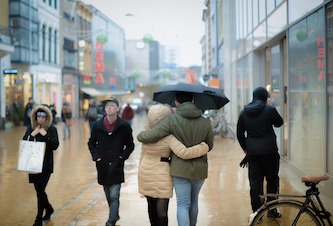When it’s cold inside, it can make your body work hard, even if it’s not super cold. A test showed that when it’s 18 degrees inside, your body starts to keep your hands warm by making the blood vessels smaller. If it gets colder, like 10 degrees, your heart beats faster and your blood pressure goes up. Your brain also gets less blood, which can make it harder to think.
Being in the cold is not just uncomfortable, it can also be bad for your health. It can make your blood thick and sticky, which can lead to heart problems or strokes. Viruses also spread more when it’s cold because people stay inside together and the air doesn’t move around much. The cold can make your nose’s defenses weaker, so you get sick easier. To stay warm, you should wear warm clothes, make your home keep heat better, and move around to make your body warm.
The test shows that we need to be careful when it’s cold and make sure we stay warm. It’s important that everyone can afford to make their home warm. Knowing how the cold affects us can help us stay healthy when it’s cold outside.
Original news source: Cold weather: What does an unheated room do to your body? (BBC)
Listen
Slow
Normal
Fast
Group or Classroom Activities
Warm-up Activities:
– Charades
Instructions: Divide the students into small groups. Give each group a set of words related to the article (e.g. cold, body, blood, health, warm clothes). One student from each group will pick a word and act it out silently while the other group members try to guess the word. The group that guesses correctly gets a point. Repeat the process with different words until all the words have been used. The group with the most points wins.
– News Summary
Instructions: In pairs, have students take turns summarizing the main points of the article to their partner. Encourage them to use their own words and keep their summaries concise. After each summary, the listener can provide feedback and ask any clarifying questions. Switch roles and repeat the activity with a different partner.
– Opinion Poll
Instructions: Create a list of statements related to the article (e.g. “Being in the cold is uncomfortable,” “Wearing warm clothes is important in cold weather,” “Staying warm can help prevent illness”). In pairs or small groups, students take turns sharing their opinions on each statement and discussing their reasons. They can agree, disagree, or provide a more nuanced response. Encourage students to use English expressions for giving opinions (e.g. “I think that…,” “In my opinion…,” “From my perspective…”). After discussing all the statements, have a class discussion to share different viewpoints.
– Vocabulary Pictionary
Instructions: Write key vocabulary words from the article on small pieces of paper and put them in a hat or container. Divide the class into two teams. One student from each team will come to the front of the class and draw a vocabulary word without speaking, while their teammates try to guess the word. The team that guesses correctly gets a point. Repeat the process with different students and vocabulary words. The team with the most points wins.
– Keyword Hangman
Instructions: Choose important keywords from the article and write blanks for each letter on the board. Divide the class into two teams. One student from each team will take turns guessing letters to fill in the blanks, with the goal of guessing the keyword. If a guessed letter is correct, write it in the corresponding blank. If the letter is incorrect, draw a part of a hangman on the board. The team that correctly guesses the keyword before the hangman is completed wins the round. Repeat the process with different keywords.
Comprehension Questions:
1. What happens to your blood vessels when it’s cold inside?
2. How does your body react when it’s really cold inside?
3. Why is being in the cold bad for your health?
4. Why do viruses spread more when it’s cold?
5. What happens to your nose’s defenses when it’s cold?
6. What can you do to stay warm when it’s cold?
7. Why is it important for everyone to be able to make their home warm?
Go to answers ⇩
Listen and Fill in the Gaps:
When it’s cold inside, it can (1)______ your (2)______ work hard, even if it’s not super cold. A test showed that when it’s 18 (3)______ inside, your body starts to keep your hands warm by making the blood vessels smaller. If it gets colder, like 10 degrees, your heart beats faster and your (4)______ pressure goes up. Your brain also gets (5)______ blood, which can make it harder to think.
Being in the cold is not just uncomfortable, it can also be bad for your health. It can make your blood thick and sticky, which can lead to heart (6)______ or strokes. Viruses also spread more when it’s cold because people stay inside together and the air doesn’t (7)______ around much. The cold can make your nose’s defenses weaker, so you get sick (8)______. To stay (9)______, you should wear warm clothes, make your home keep heat better, and move around to make your body warm.
The test shows that we need to be (10)______ when it’s cold and make sure we (11)______ warm. It’s (12)______ that everyone can afford to make their home warm. Knowing how the cold affects us can help us stay healthy when it’s cold outside.
Go to answers ⇩
Discussion Questions:
Students can ask a partner these questions, or discuss them as a group.
1. What happens to your body when it’s cold inside?
2. How do you feel when you’re in a cold place?
3. Do you like being in the cold? Why or why not?
4. What can happen to your health if you’re in the cold for a long time?
5. How can the cold make you sick?
6. What can you do to stay warm when it’s cold outside?
7. Why is it important to wear warm clothes in the cold?
8. How can you make your home keep heat better?
9. Do you think everyone should be able to afford to make their home warm? Why or why not?
10. How does knowing how the cold affects us help us stay healthy?
11. Have you ever been in a really cold place? How did it make you feel?
12. What do you think is the best way to stay warm during the winter? Why?
Individual Activities
Vocabulary Meanings:
Match each word to its meaning.
Words:
1. cold
2. body
3. blood
4. heart
5. brain
6. health
7. viruses
8. home
Meanings:
(a) The physical part of a person
(b) The organ in your head that helps you think
(c) The opposite of hot
(d) Tiny germs that can make you sick
(e) The place where you live
(f) The organ that pumps blood
(g) The red liquid that flows through your body
(h) The state of being free from illness or injury
Go to answers ⇩
Multiple Choice Questions:
1. What happens to your blood vessels when it’s cold inside?
(a) They become larger
(b) They become smaller
(c) They stay the same size
(d) They disappear
2. What happens to your heart when it’s colder?
(a) It beats slower
(b) It beats faster
(c) It stops beating
(d) It skips beats
3. What happens to your blood pressure when it’s colder?
(a) It goes down
(b) It stays the same
(c) It disappears
(d) It goes up
4. What happens to your brain when it’s colder?
(a) It gets more blood
(b) It stops working
(c) It gets less blood
(d) It grows bigger
5. Why do viruses spread more when it’s cold?
(a) People go outside more
(b) The air moves around a lot
(c) People stay inside together
(d) The air becomes warmer
6. How does the cold affect your nose’s defenses?
(a) It weakens them
(b) It strengthens them
(c) It makes them disappear
(d) It has no effect on them
7. What can happen to your blood when it’s cold?
(a) It becomes thin and watery
(b) It disappears
(c) It turns into ice
(d) It becomes thick and sticky
8. How can you stay warm when it’s cold?
(a) Wear warm clothes, make your home keep heat better, and move around
(b) Wear cold clothes, keep your home cold, and stay still
(c) Wear warm clothes, keep your home cold, and stay still
(d) Wear cold clothes, make your home keep heat better, and move around
Go to answers ⇩
True or False Questions:
1. To stay warm, we should wear cool clothes, make our homes retain heat better, and sit still to make our bodies warm.
2. The cold can weaken our nose’s defenses, making us more likely to get sick.
3. Being in the cold can be good for our health because it can make our blood thin and slippery, which can prevent heart problems or strokes.
4. If it gets warmer, like 10 degrees, our heart beats slower and our blood pressure goes down.
5. Viruses spread more when it’s cold because people stay inside together and the air doesn’t move around much.
6. When it’s cold, our brain gets less blood, which can make it harder to think.
7. When it’s cold inside, our bodies don’t have to work harder to keep warm.
8. Even if it’s not very cold, our bodies start to make our blood vessels smaller to keep our hands warm.
Go to answers ⇩
Write a Summary:
Write a summary of this news article in two sentences.
Check your writing now with the best free AI for English writing!
Writing Questions:
Answer the following questions. Write as much as you can for each answer.
Check your answers with our free English writing assistant!
1. What happens to your body when it’s cold inside?
2. How does the cold affect your hands?
3. What happens to your heart when it’s colder?
4. Why is it bad for your health to be in the cold?
5. How can you stay warm when it’s cold outside?
Answers
Comprehension Question Answers:
1. What happens to your blood vessels when it’s cold inside?
When it’s cold inside, your blood vessels become smaller to keep your hands warm.
2. How does your body react when it’s really cold inside?
When it’s really cold inside, your heart beats faster, your blood pressure goes up, and your brain gets less blood, which can make it harder to think.
3. Why is being in the cold bad for your health?
Being in the cold can make your blood thick and sticky, which can lead to heart problems or strokes.
4. Why do viruses spread more when it’s cold?
Viruses spread more when it’s cold because people stay inside together and the air doesn’t move around much.
5. What happens to your nose’s defenses when it’s cold?
When it’s cold, your nose’s defenses become weaker, making it easier for you to get sick.
6. What can you do to stay warm when it’s cold?
To stay warm when it’s cold, you should wear warm clothes, make your home keep heat better, and move around to make your body warm.
7. Why is it important for everyone to be able to make their home warm?
It’s important for everyone to be able to make their home warm so that they can stay healthy and avoid the negative effects of the cold on their bodies.
Go back to questions ⇧
Listen and Fill in the Gaps Answers:
(1) make
(2) body
(3) degrees
(4) blood
(5) less
(6) problems
(7) move
(8) easier
(9) warm
(10) careful
(11) stay
(12) important
Go back to questions ⇧
Vocabulary Meanings Answers:
1. cold
Answer: (c) The opposite of hot
2. body
Answer: (a) The physical part of a person
3. blood
Answer: (g) The red liquid that flows through your body
4. heart
Answer: (f) The organ that pumps blood
5. brain
Answer: (b) The organ in your head that helps you think
6. health
Answer: (h) The state of being free from illness or injury
7. viruses
Answer: (d) Tiny germs that can make you sick
8. home
Answer: (e) The place where you live
Go back to questions ⇧
Multiple Choice Answers:
1. What happens to your blood vessels when it’s cold inside?
Answer: (b) They become smaller
2. What happens to your heart when it’s colder?
Answer: (b) It beats faster
3. What happens to your blood pressure when it’s colder?
Answer: (d) It goes up
4. What happens to your brain when it’s colder?
Answer: (c) It gets less blood
5. Why do viruses spread more when it’s cold?
Answer: (c) People stay inside together
6. How does the cold affect your nose’s defenses?
Answer: (a) It weakens them
7. What can happen to your blood when it’s cold?
Answer: (d) It becomes thick and sticky
8. How can you stay warm when it’s cold?
Answer: (a) Wear warm clothes, make your home keep heat better, and move around
Go back to questions ⇧
True or False Answers:
1. To stay warm, we should wear cool clothes, make our homes retain heat better, and sit still to make our bodies warm. (Answer: False)
2. The cold can weaken our nose’s defenses, making us more likely to get sick. (Answer: True)
3. Being in the cold can be good for our health because it can make our blood thin and slippery, which can prevent heart problems or strokes. (Answer: False)
4. If it gets warmer, like 10 degrees, our heart beats slower and our blood pressure goes down. (Answer: False)
5. Viruses spread more when it’s cold because people stay inside together and the air doesn’t move around much. (Answer: True)
6. When it’s cold, our brain gets less blood, which can make it harder to think. (Answer: True)
7. When it’s cold inside, our bodies don’t have to work harder to keep warm. (Answer: False)
8. Even if it’s not very cold, our bodies start to make our blood vessels smaller to keep our hands warm. (Answer: True)
Go back to questions ⇧















